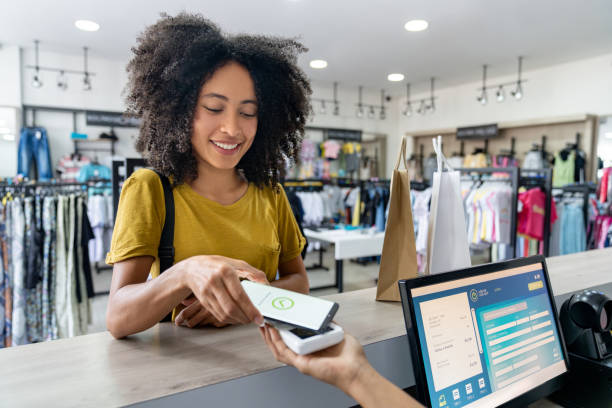Walk into almost any supermarket in 2025 and the brightest lights in the front end are usually the self‑checkout kiosks.
Retail surveys report that 77 % of shoppers now prefer to scan and pay themselves because it feels faster and more convenient, and many chains plan for half of all transactions to run through kiosks within the decade.
Yet there is still a sizable minority who will politely step aside and queue for a human cashier even when eight empty machines are blinking. Far from mere stubbornness, recent consumer‑behaviour research shows that opting out of self‑service correlates with consistent psychological profiles. Below are eight core tendencies that often—though not always—show up together when someone flat‑out refuses to use a self‑checkout lane.
1. You crave brief human connection
People who pick the cashiered lane regularly score higher on the universal need for relatedness: the micro‑interaction with a real person provides a tiny burst of social belonging that machines cannot replicate. In five studies Drexel
University researchers found that customers who used staffed lanes felt a stronger “sense of entitlement to interpersonal service” and reported significantly higher store loyalty.
Many shoppers treat the checkout as a chance to share a greeting or joke—small talk that affirms social bonds at the end of an otherwise solitary task.
From a Buddhist lens, these micro‑moments mirror the principle of inter‑being: every interaction, however fleeting, is an opportunity to recognise the humanity in another. If you feel lighter after a warm “how’s your day going?” you are not imagining it—your dopamine system just registered a social reward.
2. You feel solidarity with front‑line workers
A second, often‑stated motive is ethical concern: refusing the kiosk becomes a quiet protest against job automation.
Interviews with Canadian and U.S. shoppers show many avoid self‑checkout “because machines don’t pay taxes and cashiers need the hours.”
Scholars looking at retail technology echo the point, describing a “protect‑the‑jobs” narrative that frames opting for a cashier as a pro‑social act rather than inefficiency.
Psychologically, this maps onto empathic moral reasoning—valuing the welfare of others even when it costs a few extra minutes. Research on prosocial spending shows that small sacrifices motivated by empathy reliably boost the giver’s own satisfaction, so choosing the human lane can feel intrinsically good.
3. You experience technostress—or low tech self‑efficacy
Not everyone who bypasses the kiosk is taking a moral stand; many simply find the interface intimidating.
Meta‑analyses of technostress link low digital self‑efficacy with avoidance of any task that requires operating unfamiliar hardware.
In other words, if you are not confident you can scan produce codes, clear error messages and tap through payment screens without help, you protect your ego by queuing for the cashier instead.
The effect is strongest among older adults: a study of shoppers aged 55 + found that perceived complexity and time pressure “significantly intensified negative emotions toward self‑service technology,” driving outright resistance.
What looks like stubbornness is often anxiety management.
4. You’re distinctly loss‑averse—and hate needless hassle
Behavioural economists call it loss aversion: we feel the pain of a potential mistake more strongly than the pleasure of a quick checkout.
Shoppers in self‑service lanes are 15–20 % more likely to spot pricing errors—and therefore worry about them—than those in traditional lanes. Sociologist
Christopher Andrews adds that self‑checkout only feels faster because you are busy working; objective timing studies show it is no quicker than a cashier when something goes wrong (“unexpected item in the bagging area”).
If your internal calculator weighs every extra beep, rescan or age‑verification delay as a loss of precious minutes (and possible embarrassment), steering clear of the kiosk is simply rational risk management.
5. You prefer tradition and routine (status‑quo bias)
Decades of consumer research confirm that older shoppers adopt new retail tech more slowly.
In store surveys, seniors reported experience with fewer types of self‑service technology and rated them less favorably than younger cohorts.
The result isn’t just about age‑related dexterity; psychologists frame it as status‑quo bias—a comfort with familiar routines that lowers cognitive load.
Keeping the shopping ritual stable also maintains a sense of identity. From a narrative‑psychology view, repeating the same behaviour (“I always chat to Mary at Register 3”) reinforces a story about who you are: someone who values personal relationships over novelty.
6. You trust people more than algorithms
Algorithm‑aversion research shows we tend to forgive human error more readily than machine error.
When self‑checkout glitches, the technology itself is blamed; when a cashier miscans, we blame the situation.
Retail loss‑prevention experts note that design teams are now trying to “rehumanise the self‑checkout experience” because mechanical interactions erode customer trust and loyalty.
Drexel’s loyalty studies report the same pattern: shoppers who stuck with cashiers scored higher on interpersonal trust scales.
In short, if you instinctively feel safer putting your groceries—and credit card—in human hands, you align with a well‑documented psychological preference for relatable agents over opaque systems.
7. you dislike uncompensated labour and fairness gaps
Social psychologists define equity sensitivity as discomfort when the input‑to‑reward ratio feels unbalanced.
Regulars in the cashiered line often articulate the kiosk as “doing the store’s job for them” without a discount.
Business‑school researchers found that customers who frame self‑checkout as uncompensated effort exhibit lower loyalty unless the store reframes that effort as rewarding.
Saying “no thanks” to scanning your own basket therefore protects a fairness norm: labour—whether yours or the cashier’s—should be acknowledged and valued.
Ethical consumerism studies show that people with high equity sensitivity are more willing to queue, even to their own inconvenience, when a process feels exploitative.
8. You treat shopping as a mindful social ritual
Finally, some kiosk‑avoiders view the grocery run as a small ritual of presence rather than a chore to minimise.
Sociologists analysing everyday consumption found that many shoppers intentionally slow down to enjoy sensory cues and brief exchanges that make them “feel part of a community.”
Psychological research on rituals shows they heighten attention and emotional meaning—key components of mindfulness practice.
Choosing the human lane prolongs that ritual: you wait, observe, maybe chat with the person in front, and close the encounter with a thankful smile. If that sounds like you, refusing the kiosk is less about technology and more about honouring a moment of grounded, relational living.
Closing thoughts
None of these eight tendencies is better or worse than the others; they are simply different motivational fingerprints that shape an everyday choice. You might recognise several of them in yourself—empathy for cashiers and technostress, or loss aversion paired with a love of mindful ritual. Psychology reminds us that behaviour is rarely driven by a single factor.
So the next time you notice someone steering clear of the blinking machines, resist the urge to label them old‑fashioned. They may, instead, be exercising empathy, protecting their sense of fairness, or cultivating a few extra seconds of human connection in an increasingly automated world.







